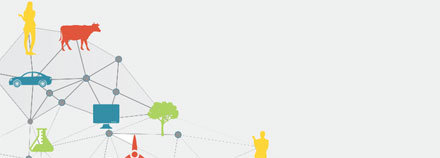
The Data Futures Forum has identified projects it says could make the most of data to tackle big national issues, like food traceability, efficient transport, diabetes and obesity, and information to support Maori groups.
Paddock to plate tracking of food could enhance productivity and lead to the development of an ‘information industry’ to support our primary sectors.
“We suggest the creation of a government/industry collaboration that builds on current industry datafication projects, includes logistics and consumer/retail data, and links to the Ministry for Primary Industries certification regimes,” says the forum’s paper.
“This is about connecting up farm management with logistics management, consumer priorities and government oversight and certification.”
Another project could address Auckland transport problem by using transport data and technology to to support the efficiency, safety and development of the road and public transport system and give information to users.
The forum suggests working with transport leaders and building on The Ministry of Transport’s Intelligent Transport Systems (ITS) Action Plan designed to introduce things like active network management, traveller information, advanced driver assistance, autonomous vehicles and payment tech over the next four years.
It suggests focusing on greater use of data and technology to support efficient transport in Auckland, along with sensor technology and giving users transport data through a relevant platform.
Data could also play its part in tackling obesity and diabetes, by understanding the drivers of rates of these diseases and way to effectively intervene, the paper says.
“We suggest a collaborative project which safely uses de-identified supermarket and weight and health information. Using privacy-by-design approaches, the project could derive a dataset that ties what households are purchasing to their weight and health outcomes over time.
“Findings from that study should be used to develop information and policy for government, to enable businesses to support consumers to make healthy decisions, and give health providers new tools for working with patients.”
Another area with potential for better data use is transient families, which the forum says impacts children’s education achievements, as it results in children frequently changing schools.
It suggests working with trusted brokers like the Salvation Army and other non-government organisations to use their contacts and data to encourage families to receive government entitlements.

The forum also highlights the opportunity to support Maori development through collaboration based on sharing public and private data with Maori groups. It identifies using Statistics New Zealand’s integrated data infrastructure (IDI) to allow Maori researchers and analysts to get direct access to data. Adding ethnicity data to the IDI would support this, it says.
An independent data council should be set up to represent New Zealanders, advice the government and data users, support existing regulators, develop and share best practice and promote data use that creates value, the forum says. It could initially play an advisory role, but as the data landscape becomes better understood it could undertake inquiries and investigate complaints, and provide industry accreditation and audits to license companies for particular data activities and grade ‘trusted users’.
The forum says it might also take an enforcement role and impose sanctions on inappropriate or unethical data use.
It also wants to see a data champion appointed to promote the use of open data and explore which data needs to be protected. And it wants to review current legislation like the Official Information Act, the Privacy Act, the Public Records Act, the Statistics Act and the Copyright Act.
The organisation is asking people to read its full paper and explore how their sector could get a data project up and running.
The forum published a paper earlier this year highlighting the economic and social benefits of smarter data use.




